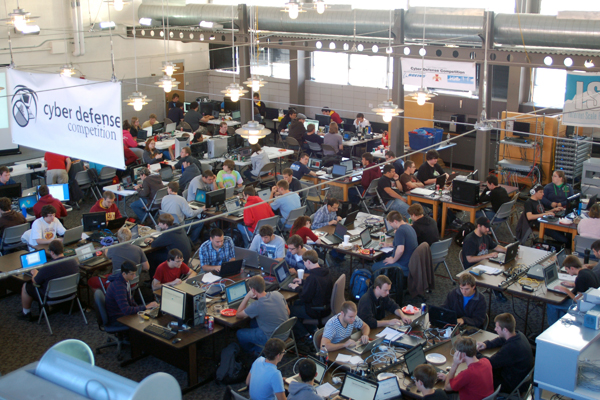Iowa State Electrical and Computer Engineering hosted its annual student cyber defense competition on Saturday. With more than 150 student participants, the event ranked as the largest cyber defense competition in the world.
Iowa State students were split into teams and were given two weeks to build their own systems on virtual machines that could stand up to cyber-attacks and still function properly. Team QWERTY took first place and was comprised of captain Brian Reber along with James Kujawa, Daniel Stiner, James Carey, Eric Everett, David Koster, Alex Sobek, and Curtis Ullerich. Team Creeper took second with Sony Security Team in third.
Doug Jacobson, University Professor, and Julie Rursch, Lecturer, organized the original cyber defense competition in 2005 and have seen it grow substantially over the last seven years.
“A bunch of us got together and talked about how we could do competitions like this,” Jacobson said. “The result of that meeting planted the seed of running competitions like this.”
The teams of students are identified as Blue Teams and are awarded points based on how their systems stand up to attack. Points are also awarded for detecting and fixing attacks. Blue Teams defend against attacks from the Red Team, which is comprised of cyber-security professionals from all over the Midwest. The Red Team’s goal is to either plant or capture flags within Blue Team systems. These flags are proof that the Red Team was inside of a Blue Team system.
“Planting and taking flags prevents the Red Team from just destroying the Blue Teams’ computers,” Jacobson said. “They’re really incentivized to be stealthy.”
Finally, the whole competition is overseen by the Green Team, or end users. The Green Team ensures Blue Team systems are functional and usable, in addition to being operational.
“It’s a giant room full of kids on keyboards. There’s a buzz of activity associated with it,” Jacobson said. “It’s a party atmosphere. We really try to create an environment that is fun, but still a pretty intense competition.”
The impact of these ever-growing competitions is starting to be felt across the cyber-security landscape.
“Companies are starting to look for this on resumes,” Jacobson said. “They will ask ‘did you participate in a cyber-defense competition?’ It’s starting to become sort of a prerequisite to getting cyber-security jobs.”
[pb_slideshow group=”0″]